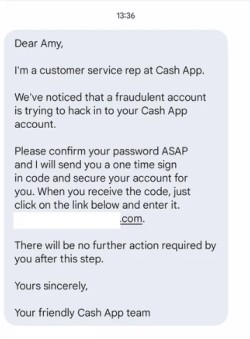Under the pretense of the Cash App, new frauds have been making their way across the market via a variety of channels, including social media, emails, texts, and other platforms.
In this post, we’ll warn you about these frauds that take place using the Cash App and provide advice on how to avoid losing money or important information to con artists.
What is Cash App?
Cash App is a peer-to-peer (P2P) mobile payment app that facilitates money transfers. Additionally, you can trade Cryptocurrencies, purchase stocks with Cash App, and make payments at partner stores for products and services.

Recently, several consumers have lost a significant amount of money to scammers operating under the Cash App moniker. Scams occur in a variety of ways and are advertised on many platforms.
Read: ITP Corp Collapsed
Cash App Scams
The first kind of scam operating under the Cash App moniker is the impersonation of customer support. Stealing someone’s Cash App credentials is the main goal here, as it allows thieves to steal money or, in certain cases, ask for money directly from scammers.
In this kind of scam, scammers impersonate Cash App customer service representatives and send emails or texts to their targets, claiming that there is a serious problem with their Cash App account and that they require their login credentials to resolve it.

Online retail shop scams are another kind of Cash App scam. To assist small business owners in expanding their operations, Cash App also enables business account users to offer products and services online via their platform.
As a result, scammers mimic the Cash App website’s design and use the Cash App brand and logo to construct phony online stores. To trick more individuals into falling into their trap, the con artists offer phony things at extremely large discounts on their fictitious internet store.
Additionally, scammers occasionally guarantee large returns for cryptocurrency investments made through Cash App. As a result of these exaggerated and inflated profits, many customers fell victim to the con artists’ traps. Usually, text messaging and social media advertising are also used to deliver these promises to the victim.
There are a few ways to identify these scams, such as grammatical errors in emails and texts, slight alterations in website domains, and email addresses operating under the name of Cash App.
Lack of professionalism in the tone of messages in e-mail is also one of the key red flags that can help you to detect these scams.
You can also verify the legitimacy of a website run by scammers by looking up SSL certificates on it. Additionally, the fraudulent website has grammatical faults and a dearth of business-related information on the About Us page as well.
Read: TV Licensing Email Scam

Scam
http://topsmartiptv.com